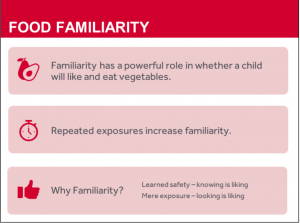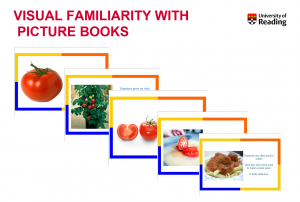Visual Familiarity & Vegetable Picture Books



Research led by Professor Carmel Houston-Price has been particularly interested in the role of visual familiarity and food neophobia (food fussiness) in preschool children.
To investigate visual familiarity the research team created and tested how vegetable picture books would help change children’s behaviour toward vegetables, particularly comparing vegetables they were familiar with and those which they were not familiar with.
Over a number of studies Professor Houston-Price and her team have shown that reading a picture book over a two week period increases a pre-school child’s willingness and consumption of eating a vegetable, particularly for vegetables that children are not familiar with before reading a picture book. For more information about the research studies access the academic papers below.
- Houston-Price, C., Butler, L., & Shiba, P. (2009). Visual exposure impacts on toddlers’ willingness to taste fruits and vegetables. Appetite, 53(3), 450–453. https://doi.org/10.1016/j.appet.2009.08.012
- Heath, P., Houston-Price, C., & Kennedy, O. (2014). Let’s look at leeks! Picture books increase toddlers’ willingness to look at, taste and consume unfamiliar vegetables. Frontiers in psychology, 5, 191.
- Owen, L. H., Kennedy, O. B., Hill, C., & Houston-Price, C. (2018). Peas, please! Food familiarization through picture books helps parents introduce vegetables into pre-schoolers’ diets. Appetite, 128, 32-43.
In 2019-2020 the research team participated in the See & Eat project funded by an EU initiative (EIT-Food). This project aimed to explore whether visual familiarity effects could be found from the use of ebooks and whether the effects shown in UK families could be found in Italian (2019) and Polish (2020) families.
For a summary into why ebooks may be an effective healthy eating intervention see the paper published in the Nutrition Bulletin, link below.
To find out more about See & Eat Project check out our Projects page for more details.
Family Mealtime Interventions
Recent research examining family mealtimes has involved the development of an email programme to encourage ‘Healthy Happy Family Eating’, funded by Netmums, the parenting organisation. We have also investigated the role of parents’ feeding goals in mealtimes. This work has included the development of a tool to measure parents’ family mealtime goals which has open access publication and is available here for researchers to use. Ongoing research is investigating family conflict and family mealtimes, mealtime stress and goal conflict in mealtime decision making.
Healthy Eating Game Interventions
Food Insecurity
